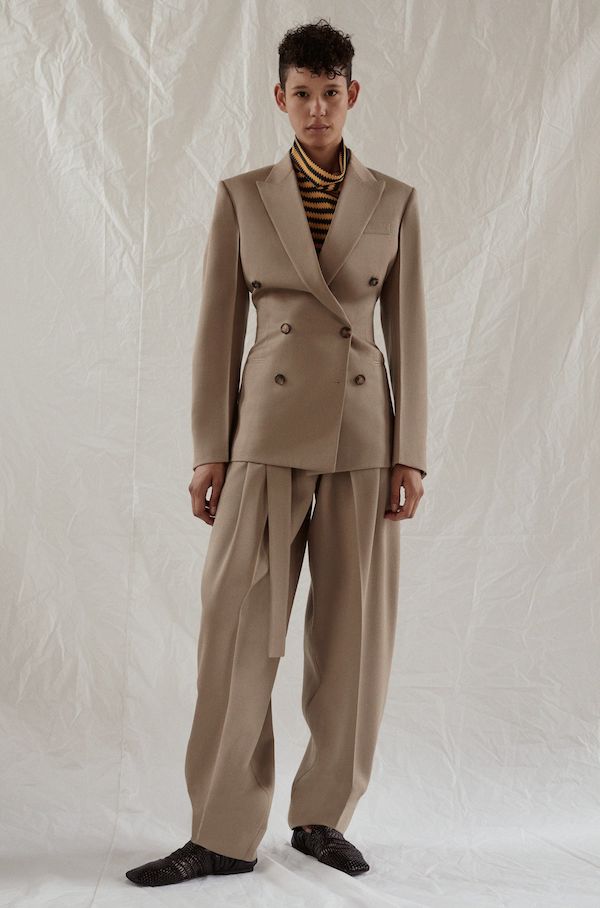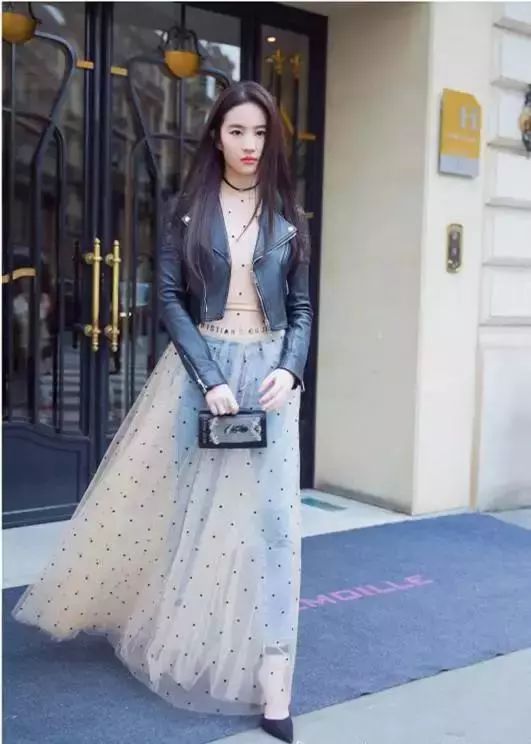Gender bending in the Sinosphere
« previous post | next post »
Don Clarke has called to my attention a new bilingual, digraphic expression: “娘man结合”. That's "niáng man jiéhé ('woman man [the English word] combination')".
It’s a women’s fashion style that combines femininity in one part of the outfit with manliness in the other — like wearing a colored print dress with an army jacket. Supposedly, “man” is read in the first tone.
Don remarks:
This expression must have the authorities very distressed; not only does it contain foreign words spelled in letters, but it also has the disfavored style "niáng 娘" ("mother; woman; mum; ma; a woman; young girl / woman; young lady; a form of address for an elderly married woman; effeminate [coll.]") . No less than the Xinhua News Agency recently inveighed against the sissified “娘炮”之风 (basically, the Korean boy-band look) as unmanly.
Here’s an account of the controversy (in Chinese).
There's a lot of unpacking to do here.
First of all, “niáng man jiéhé 娘man结合” ("woman man combination") is a semi-masculine fashion style for women, whereas "niáng pào 娘炮" ("m/sissy bang") is a playful or derogatory reference to young men who stereotypically have the following types of behavior (according to Baidu and other sources):
when he goes to the bathroom he likes to go with someone else
likes to wear tight pants and clothes
likes to take selfies and photos of the food he eats.
likes to gossip
likes to become bosom pals with girls who flirt with guys
likes to use facial masks and perfume / fragrances
is fussy about his living conditions
enjoys shopping for clothing
tends to bargain when he shops
has a girlish personality
spends a lot of time looking in the mirror
pays a great deal of attention to his hair style and appearance
etc.
In short, niáng pào 娘炮" ("m/sissy bang") 娘炮 refers to men whose appearance, personality, posture, behavior, mentality, and facial expressions are distinctly feminine.
The reason “niáng man jiéhé 娘man结合” ("woman man combination") and "niáng pào 娘炮" ("m/sissy bang") have become intertwined in public discussion is because they both include the problematic term "niáng 娘" ("mother; woman; mum; ma; a woman; young girl / woman; young lady; a form of address for an elderly married woman; effeminate [coll.]"), while the former signifies a boyish / manly fashion adopted by young women whereas the latter suggests a girlish / feminine style embraced by young men.
The controversy over "niáng pào 娘炮" ("effeminacy") erupted after the broadcast of a TV program called "Kāixué dì yī kè 开学第一课 (The First Lesson of the Semester)" in early September. The show was produced and aired by CCTV 1, the most influential among all TV channels in China, and the Ministry of Education even notified the parents of all elementary and middle school students that they should watch this show with their children. Yet no sooner had the show been broadcast than the station was assailed by irate parents and citizens complaining that the extravagantly dressed male actors wearing heavy makeup gave the wrong message to the young viewers who watched the program. Internet debate (e.g., Weibo) centered on the program fairly sizzled, with most participants being sharply negative.
Under such public pressure, Xinhua News agency and many other official media responded by writing critical editorials concerning "niáng pào 娘炮" ("effeminacy") that the program was deemed to have espoused. The Xinhua News Agency article cited above was the most vitriolic official denunciation of "niáng pào 娘炮" ("effeminacy"). People's Daily chose to be milder in their argument that diversity should be respected, though a more manly aesthetics was favored. The article "Shénme shì jīntiān gāi yǒu de nánxìng qìzhí 什么是今天该有的男性气质" ( "What sort of masculinity should there be today?") was written by the editorial department of People's Daily (9/7/18).
I recall the charged atmosphere of the weeks following the broadcast of the offending episode of "Kāixué dì yī kè 开学第一课 (The First Lesson of the Semester)"; there was much ringing of hands and distress over the imagined impact of such alleged unmanliness on society: lack of soldiers for the army and navy, inadequate manpower for factories, not enough fathers for families, and so on.
Eventually the hot rhetoric calmed down, and now it seems to have morphed into a milder form of fashion preferences typified by the esthetics of “niáng man jiéhé 娘man结合”("woman man combination").
In an effort to track down the source and significance of pào 炮 (lit., "cannon", but in current parlance often used in the sense of "bang" [casual sexual encounter]), I came upon several other expressions in which it occurs:
tǔpào 土炮 (a disparaging term describing someone rustic)
sānpào 三炮 (Dongbei [northeastern] topolect, a derogatory term for someone reckless and thoughtless)
dàpào 大砲 ("big mouth" — this is an old term that I've know for as long as I've been studying Mandarin)
This approach having proved inconclusive, I followed the lead of a couple of correspondents who thought that the contemporary pào 炮 (lit., "cannon; bang") usage might have originated in Taiwanese drama. When I asked Taiwanese informants if that were true, they denied it, saying that they thought it came from the mainland to Taiwan.
My Taiwanese informants deny that pào 炮 in the sense of "casual sexual encounter" derives from Taiwan. All the more, they have only recently become familiar with "niáng pào 娘炮" to signify an effeminate male. I myself remember clearly that the Mandarin term for effeminacy in Taiwan decades ago was niángniáng qiāng 娘娘腔, and I always thought that was interesting from a linguistic point of view, since qiāng 腔 (lit., "chamber / cavity [of the body]") connotes "speech; tune; accent; pitch; intonation").
Another expression for effeminacy in Taiwan Mandarin is nǚxìnghuà 女性化 ("feminization").
The Taiwanese (Hoklo) term for effeminacy is cha-bo-the 查某體, which carries strong negative connotations.
One Taiwan informant comments:
I don't think 炮 is a Taiwanese morpheme. Aside from its original meaning of "cannon", when used as a slang term, 炮 usually has something to do with sex, similar to the word "bang" in English, for example, 打炮 (to have sex), 约炮 (to arrange casual sex) and 炮友 (friend with benefits). This usage is mostly characteristic of Mandarin speakers in Taiwan, so I believe it should be used in Mainland China as well. For Taiwanese speakers, they will use the term gàn 幹 (with embedded links to earlier posts on this term) instead.
So what do we end up with?
One of my correspondents (a young woman) straightforwardly put it this way:
I agree with your understanding of the term "娘man结合". This term is being used so commonly now, especially when people talk about outfit styles and personal styles. Personally, I really don't like this expression. Even hearing it makes me feel slightly uncomfortable. First, this term strangely combines an English word with a Chinese character (娘) whose usage might well be considered unconventional. I don't think the character 娘 has been used as a adjective before. (Please correct me if I am wrong on this.) Second, I think this term opposes "娘 girly, feminine" to "man 男性的 manly" in terms of personal style / fashion style. However, I think in the case of personal style / fashion, both femininity and masculinity are fluid instead of fixed or rigid. How do people define what item / style is absolutely feminine or manly? I prefer the term "中性风" (the English term should be unisex I guess).
Again, I don't like the term "niáng pào 娘炮" because I think it's derogatory. Think about the equivalent term for girls who are more manly, more like tomboys. Those girls are tough and brave, and often are independent and are able to do physically demanding jobs usually done by men. These girls are referred as "nǚ hànzi 女汉子 ("tough gal")", yet the authorities are not so concerned about this expression. Rather, many people think 女汉子 is a compliment.
I think a man who naturally cares about his appearance, hairstyle, personal style, or a man who has a softer personality should not be targeted and labeled as "niáng pào 娘炮". Moreover, I guess the authorities are more concerned about "niáng pào 娘炮" being the trend (especially the celebrities and young idols) that young people are mimicking rather than a group of men who are naturally this way.
Somewhat different views were expressed by another correspondent, also a young woman:
As for my opinion concerning "娘man结合", I think I'm qualified to talk about it since I was especially fed up with and even pestered by the explosion of such fashion trends during which many TV series and fashion magazines were collaborating to besiege people to sell an image of "dà nǚrén 大女人", the big woman. It is in fact very different from “niáng pào 娘炮”, another gender ambiguous term, for it stresses the masculinity of women, contrary to the femininity of men. Just think about the success of Celine, a French fashion brand advertising oversized clothes. For instance, formal suits that are normally the choice of established men are recommended for women, like this:
And lots of interpretations about "big women" were born from different perspectives, such as female fashion trend "sexual frigidity" and mix match of different pieces with high heels, a long veil, a leather jacket and an inharmonious choker, such as this one:
Therefore, I don't think 娘man结合 is a term the administration will loathe, for I guess the administration would like those hard working women who could for one thing take care of their families and present themselves as “娘” — feminine wives and loving mothers — who, on the other hand, work hard in offices and fight like men. The interaction between "娘" and "man" could be used to construct an ideal image for both sexes.
Finally, for the definition of “niáng pào 娘炮”, I would very much agree with your image of Korean pop stars. The following images incurred parents' complaints and even forced CCTV to apologize.
Final comment from another correspondent:
For "娘Man", a weird thing is that it has gradually become a more or less neuter adjective, but it is a good term when describing women, while when describing men, it becomes a term of opprobrium. It also reflects a gender value disparity that it is ok for women to be masculine but it is bad for men to be feminine.
Worth pondering.
Reading
- "Gender bending" (10/6/15)
- "Apps for casual sex" (8/4/16)
- "Mandarin neologism: 'appointment to fire a cannon'" (1/10/18)
[Thanks to Grace Wu, Melvin Lee, Sophie Wei, Michael Cannings, Mark Swofford, Jinyi Cai, Zeyao Wu, and Qing Liao]



David Marjanović said,
November 5, 2018 @ 10:28 am
…?
Ah, the unintended side effects of having official media.
Victor Mair said,
November 5, 2018 @ 12:54 pm
From Don Clarke:
Here’s a SCMP piece that gives some more context to what I saying the other day about the panic in China over the perceived sissification of males:
"Inside China’s training camps, where boys are learning how to be men", South China Morning Post (11/4/18)
Former physical education teacher is helping soft sons find their lost masculinity
More than 20,000 children have taken part in the courses
https://www.scmp.com/news/china/society/article/2171040/inside-chinas-training-camps-where-boys-are-learning-how-be-men
Don Clarke said,
November 5, 2018 @ 1:03 pm
Ah, training boys to be more masculine. What could possibly go wrong?
Vulcan With a Mullet said,
November 5, 2018 @ 3:38 pm
So "sānpào" could be translated idiomatically into English as "loose cannon"?
Victor Mair said,
November 5, 2018 @ 7:48 pm
From Hill Gates:
An important aspect of youthful goofy self-expression is the turbo-charged speed of change in fashion, driven by the need of clothing makers to get novelties on the market first (see Ka Zhiming's fine study). Late-producers get lower profits.
Hence the endless novelty achieved from random combinations, visual oxymorons, and, of course, the culturally over-gendered. Rabid lust for superficial individualism doesn't hurt either. Seeking explanation from imagined sexualities among the sexually inexperienced is probably a waste of intellectual energy. (But ALL NEW AND IMPROVED!!)
TIC said,
November 6, 2018 @ 8:47 am
A little help, please… In the translation ("m/sissy bang"), what is the "m" intended to signify?…
nn said,
November 6, 2018 @ 10:42 am
I would suppose “missy” or “miss”.
melboiko said,
November 6, 2018 @ 5:01 pm
Heh, I'd hit all items on the niáng pào list in my past life. I feel (as they say) personally called out. In fact I thought I was a niáng pào for the longest time, but turns out I'm just a (literally) dà nǚrén, now complete with the inharmonious choker et cetera.
Philip Taylor said,
November 6, 2018 @ 5:37 pm
Neither my wife nor I could make any sense of "m/sissy bang" either, so an explanation from our revered lead contributor would be much appreciated.
Victor Mair said,
November 6, 2018 @ 6:29 pm
"m/sissy bang"
nn already explained it
TIC said,
November 7, 2018 @ 7:23 am
Thanks, nn (and VM)… It's so obvious and intuitive — in enlightened retrospect… Dunno why the real answer didn't even occur to me as a possibility… I s'pose the context led me to suspect that the "m" signified "male"… Thanks again…